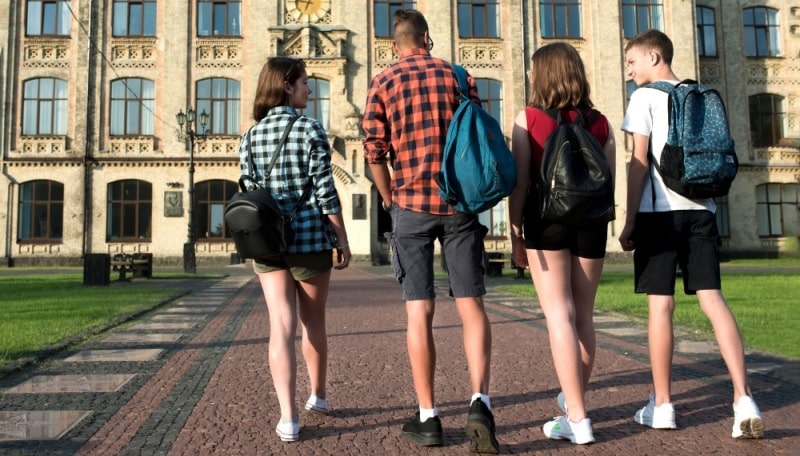If you’re curious about secondary education in the UK, you’ve come to the right place. Whether you’re a student, parent, or just someone interested in learning more about the British education system, this article will give you the lowdown on everything you need to know about secondary education UK. So, grab a cuppa (that’s British for a cup of tea), and let’s dive in!
We’ll cover how secondary school UK works, what the typical age range is, and how it fits into the larger framework of education secondary in the country. If you’ve ever wondered how does British high school work or what the differences are between UK high school and high school England, this guide will break it all down in simple terms.
What is Secondary Education in the UK?
Imagine secondary education as the bridge between childhood and adulthood – it’s where young minds start to shape their futures. In the UK, secondary education typically covers students aged 11 to 16, although some schools extend to 18. It’s like a caterpillar transforming into a butterfly; students enter as children and emerge as young adults ready to take on the world.
Secondary Education System in the UK
The UK’s secondary education system is a bit like a well-oiled machine, with each part working together to create a comprehensive learning experience. Let’s break it down:
Key Stages in UK Secondary Education
Secondary education in the UK is divided into two key stages:
Key Stage 3 (ages 11-14)
This is the appetizer of secondary education, giving students a taste of various subjects.
Key Stage 4 (ages 14-16)
The main course, where students focus on their chosen subjects for GCSE exams.
Types of Secondary Schools in the UK
Just like there are different flavors of ice cream, there are various types of secondary schools in the UK:
Comprehensive Schools
The most common type, open to all abilities.
Grammar Schools
Selective schools that admit students based on academic ability.
Academy Schools
Independently run schools funded by the government.
Free Schools
Similar to academies but set up by community groups, parents, or organizations.
Faith Schools
Schools with a particular religious character or formal links with a religious organization.
Specialist Schools
Focus on particular subject areas, like arts, sciences, or sports.
Read More: UK Schools
Secondary Education Qualifications in UK
Secondary education qualifications in the UK refer to the academic certifications students typically obtain at the end of their compulsory education. These qualifications are crucial for further education and employment opportunities. Let’s break down the main qualifications in the UK secondary education system:
- GCSEs (General Certificate of Secondary Education)
- National 5s (Scotland)
- BTECs (Business and Technology Education Council)
- A-Levels (Advanced Levels)
- Scottish Highers
- International Baccalaureate (IB)
- T-Levels (Technical Levels)
- NVQs (National Vocational Qualifications)
- Cambridge Nationals
Schools that Offer Secondary Education in the UK
In the following we have prepared a list of the best Schools in the UK that offer secondary education:
- Eton College
- Westminster School
- Manchester Grammar School
- Cheltenham Ladies’ College
- King Edward VI Grammar School
- Henrietta Barnett School
- Nonsuch High School for Girls
- St Paul’s School
- North London Collegiate School
- Wycombe Abbey
- Brighton College
- Alleyn’s School
- Brynteg Comprehensive School
- Hutchesons’ Grammar School
- Methodist College Belfast
- The Perse School
- Concord College
- Haberdashers’ Aske’s Boys’ School
- James Allen’s Girls’ School
- Magdalen College School
Read More: UK Higher Education
Conclusion
Secondary education in the UK is like a grand adventure – full of challenges, opportunities, and the potential for incredible growth. From the structured curriculum to the evolving focus on skills and well-being, it’s a system designed to prepare young people for the complexities of the modern world.
As we look to the future, it’s clear that secondary education in the UK will continue to adapt and evolve. The integration of technology, the focus on personalized learning, and the emphasis on global citizenship and sustainability are all shaping a system that aims to create well-rounded, adaptable, and socially conscious individuals.
Whether you’re a student navigating this system, a parent supporting a child through it, or simply an interested observer, understanding secondary education in the UK is key to appreciating its role in shaping the next generation. So, as they say in Britain, “Keep calm and carry on learning!”
FAQs About Secondary School UK
Is school uniform mandatory in UK secondary schools?
While not a legal requirement, most UK secondary schools do have a mandatory uniform policy.
How long is the school day in UK secondary education?
Typically, the school day runs from around 8:30 AM to 3:30 PM, though this can vary slightly between schools.
Are there standardized tests other than GCSEs in UK secondary education?
Yes, students take SATs at the end of Key Stage 3 (age 14), though these are less high-stakes than GCSEs.
Can students change their GCSE subject choices once they’ve started the courses?
While possible, it’s generally discouraged and can be challenging due to missed coursework. Any changes are usually made within the first few weeks of Year 10.
How does the UK secondary education system accommodate students with special educational needs?
UK schools are required to make reasonable adjustments for students with special educational needs, which can include additional support, modified curricula, or specialized equipment.

